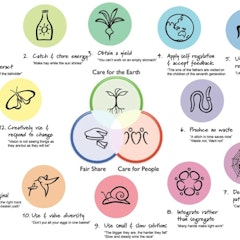Reporting On:
Permaculture Principles for whole systems approaches
What is permaculture?
Permaculture is a creative design process based on whole-systems thinking informed by ethics and design principles that feature on this site.This approach guides us to mimic the patterns and relationships we can find in nature and can be applied to all aspects of human habitation, from agriculture to ecological building, from appropriate technology to education and even economics.
By adopting the ethics and applying these principles in our daily life we can make the transition from being dependent consumers to becoming responsible producers. This journey builds skills and resilience at home and in our local communities that will help us prepare for an uncertain future with less available energy.
Central to permaculture are the three ethics. The ethics earth care, people care and fair share form the foundation for permaculture design and are also found in most traditional societies. Ethics are culturally evolved mechanisms that regulate self-interest, giving us a better understanding of good and bad outcomes.
The techniques and strategies used to apply these principles vary widely depending on the location, climatic conditions and resources that are available. The methods may differ, but the foundations to this wholistic approach remain constant. By learning these principles you can acquire valuable thinking tools that help you become more resilient in an era of change.
https://permacultureprinciples.com/
Click on a thumbnail to preview media

